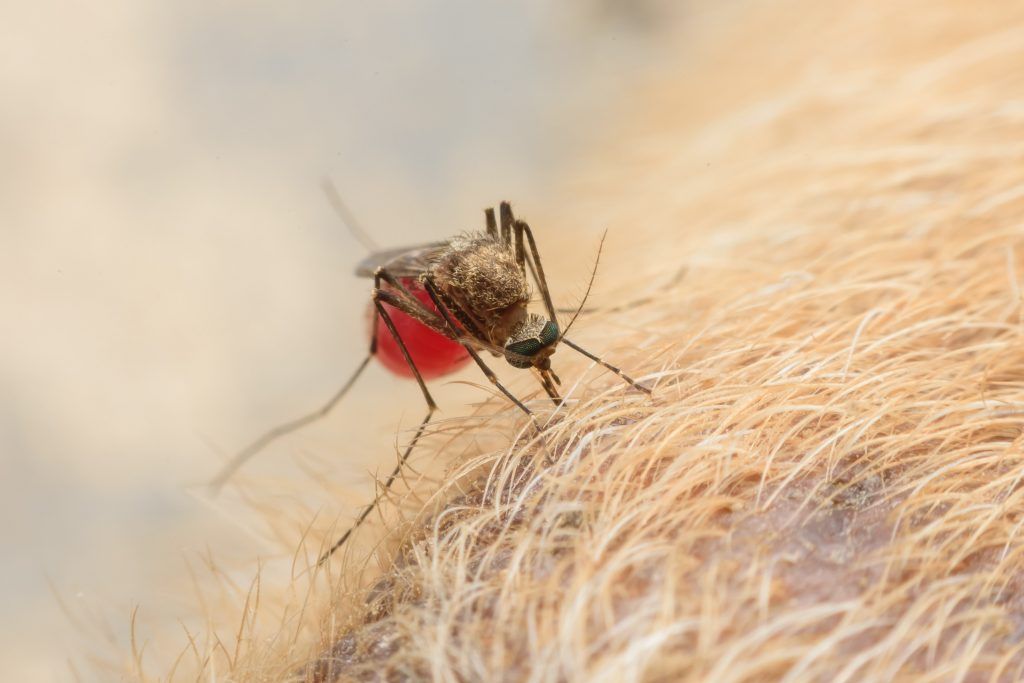It is said that “the bark is worse than the bite,” but when it comes to a bite from a mosquito, your furry friend might be at risk. Going for a hunt with your dog could be such a sight, the panting, purring, and rumbling, but just one bite from a mosquito could ruin the hunt for a big game.
As a concerned pet lover, you might have mind-boggling questions about dogs and mosquito bites; not to worry, you will soon find out if your dog can get mosquito bites and some intriguing facts about the risk implications that will buzz your mind and how to prevent them.
What are Mosquitoes?
Everyone knows what a mosquito looks like, but not everyone knows that mosquitoes are descendants of small flies from a family called Culicidae. Even its name is Spanish for the word “little fly.” But their flight without its strongest ally- the piercing mouth part will not bring the next meal home. When all this comes in synchrony; its 6 legs, 2 wings and scaly elongated slender body alongside its nocturnal behavior, the mosquito becomes a threat both to humans and dogs.

Photo Credit: Shutterstock
Can dogs get bitten?
Understanding the needs of mosquitoes will give you an insight into this popular question. The female mosquitoes are known to need blood meals for reproductive purposes, unlike the male, who feeds on nectar and other substances.
Therefore, dogs become prey to over 3000 species of female mosquitoes out there looking to get their next meal and reproduce successfully. As long as it meets its criteria of a meal, mosquitoes will bite your dog if given the opportunity to.
As a Veterinarian, I have had many clients ask me if mosquitoes could bite their dogs. Many pet lovers have not given this a thought and, therefore, do not take precautionary steps to prevent their dogs from mosquito bites. If given the opportunity, your dog could be bitten by mosquitoes when left unprotected in a mosquito-endemic environment.
Are mosquitoes a threat to dogs?
Mosquitoes pose a big threat to dogs, and this has been evident in the many heartworm cases recorded in dogs over the years. Infected female mosquitoes are known to be carriers and transmitters of heartworms in dogs. Dogs, being a suitable host for heartworms, fall prey and battle with heart issues afterward.
This could be life-threatening for your dog if proper medical care is not given. After a bite from an infected mosquito, the Dirofilaria immitis which is also known as the heartworm, crawls up to the heart of your dog through the bloodstream. It matures into an adult worm that thrives within the blood vessels and related organs like the lungs and liver, deteriorating the health condition of your dog.
There are other possible diseases that mosquitoes can transmit to your dog through a bite, such as:
West Nile Viral Infection
Eastern Equine Encephalitis (EEE)
Leishmaniasis
Zika Virus
Are There Symptoms To Look Out For?
The downside of a mosquito bite symptom is that it is usually conspicuous at a fatal stage after a disease incurred during the bite has become lethal.
For heartworms, it takes about 6 months before your dog starts showing signs of a heartworm infection. Only an early test can preclude this from happening. But early signs could range from itching to depression.

Though one might not want to use a cannon to kill a mosquito, seeing a reddish-raised welt on the body of your dog is something to fret about.
Using the common Heartworm disease as a reference, there are four typical stages of symptoms you should look out for if you suspect your dog has been bitten by a mosquito. They are:
Stage I
In this stage, your dog might not show any serious symptoms other than itching and discomfort. This usually happens almost immediately after the bite.
You will notice your dog itching, using its paws or teeth to relieve itself. Dogs itch for different reasons, taking a closer look at the point of itch by a Vet would help preclude any adverse effect.
Stage II
At this stage, your dog might begin to cough occasionally. You would also notice your dog seems unusually tired after taking a walk in the park or immediately after playing fetch.
There is no need to say that your dog needs to see a Vet for proper checkup. It’s still timely to visit a Vet if your dog is showing these symptoms.
Stage III
In stage III, the cough becomes persistent coupled with apparent breathing difficulties. At this point, the population of worms has increased and begun to cause obstructions in the heart and lungs leading to typical changes which can be detected under a Chest X-ray.
These changes are as a result of the lodgings and activities of these heartworms. No wonder your dog shows symptoms of weakness even without engaging in any activity.
Stage IV
A concerned pet lover should not let one’s dog suffer from heartworm disease up till this point. This stage is also known as the Caval syndrome stage, where there is so much worm burden in the heart, blocking blood flow to the heart.
This type of heartworm condition could be resolved with surgery but with a very low prognosis. Not all dogs with heartworm disease get to this stage. It is expected that you visit a Vet if you observe symptoms from stage I or II above.
With the proper treatment, prescriptions, and medication, your dog is assured of getting back on its feet.

Photo Credit: Shutterstock
Prevent Your Dog From Being Bitten
There is nothing more soothing than the song of a mosquito that can’t get through the mesh to bite you.
Preventing your dog from getting bitten by mosquitoes is similar to the principles you lay down for yourself to prevent mosquito bites. They include:
- Clearing all mosquito breeding sites: Bushes, open water surfaces, and stagnant water bodies around the house are breeding sites for mosquitoes. Clearing them up will help minimize the population of mosquitoes around your home and around your dog. In the long run, you would have fewer mosquitoes to contend with.
- Using mosquito repellents: Using synthetic repellents such as DEET, Picaridin, and PMB is sure to wade off mosquitoes from your dog. But, care should be taken when administering these synthetic repellents to avoid neurotoxicity. Sparse application is advisable. There are safer and more natural options when it comes to mosquito repellents for dogs. They include essential oils, cinnamon oil, thyme oil, and fennel oil, amongst others. Though these oil options are not just used alone as repellents but are also diluted with certain substances, making them effective and less adverse to the dog.
- Use mosquito Nets: Mosquito nets are another brilliant way to keep mosquitoes at bay. With nets, it will be difficult for mosquitoes to get to your furry friend. These nets can be used at the entrance of your dog cages or kennels.
- Deworm your Dog: Deworming your pet is a great way of reducing worm burdens. Peradventure, your dog has been bitten by mosquitoes and is at risk of contracting Heartworms; deworming will help mitigate such a possibility and nip it in the bud. Dogs below 6 months should be dewormed every month, while dogs above 6 months should be dewormed every 2-3 months.
- Visit a Veterinarian Regularly: Visiting the Vet with your dog for regular checkups should be a habit as a concerned dog owner. You should make it a culture to visit the Vet every 6 months for a routine checkup. This will help stop or mitigate any underlying condition or disease your dog might have.
Homemade mosquito repellants
A lot more research would need to be conducted on off-the-shelf mosquito repellants before I could trust that they won’t cause any adverse effects on your dog.
Fortunately, there are several natural options that work well.
To relieve you of your burden, we have compiled a list of naturally sourced mosquito repellants you can try at home. Here are a few:
- The Homemade Bug Spray: This repellant is a no-brainer as it requires just a few ingredients to make. You will need 1 glass spray bottle,15 drops of lemon eucalyptus essential oil, 2 oz witch hazel, or any other carrier oil like almond oil (oil is recommended if your dog loves to play with water).
- Essential Oils: These are powerful repellants used even by plants to ward off insects. They do a great job repelling mosquitoes, too. Formulating this spray is simple; all you need is a drop of essential oil and 1 ml of a carrier oil (grape seed oil). Essential oil can’t be used directly on your dog and would need some dilution by adding carrier oils.
- Cinnamon Oil: This is also an essential oil; therefore, the process of making this is the same as any essential oil. Mix a drop of cinnamon with 1 ml of any carrier oil to make a mosquito repellant spray for your dog’s use.
- Neem Oil: This is one of my favorite dog repellants! It is not just an amazing use alone of mosquito repellent but has anti-bacterial, antiviral, and antifungal properties to help your dog live a healthy life. To use this, apply a drop of neem oil on the top of your dog’s head, along its back, behind the ear, and even at the tip of the tail. Facts have it that over 200 species of insects, including mosquitoes, are affected by neem oil.
- Garlic: This is the easiest type of non-topical mosquito repellant to make. Your dog can consume garlic but at a recommended dose of ¼ clove for dogs weighing 10 pounds and not more than 2 cloves per day for giant breeds. Dogs below 10 pounds can take ⅛ cloves daily. The garlic should be peeled 15 minutes before adding it to the dog’s meal. As a preventive method, garlic is fed to dogs 1 month before the mosquito season starts, which is mostly in the summer.
Treatment of mosquito bite in dogs
You don’t procrastinate when a bloodsucking bug lands on your skin; you shouldn’t joke with one on your dog either. If you think your furry friend has been bitten by mosquitoes, the first step to take is to visit the nearest Vet for a checkup, tests and proper medication. At the Vet, blood samples will be taken to check for parasites, prescription and medication will depend on the severity of the condition.
























